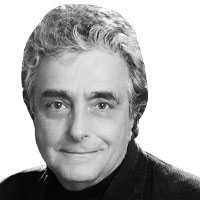Beneath the gold onion domes of the Danilov Monastery a few miles south of the Kremlin, Vladimir Putin’s chief shaman explains why Russia is hell-bent on destroying Ukraine.
“If we see [Ukraine] as a threat, we have the right to use force to ensure the threat is eradicated,” Russian Orthodox Patriarch Kirill recently preached to his church’s 90 million faithful followers. “We have entered into a conflict which has not only physical but also metaphysical significance. We are talking about human salvation, something much more important than politics.”
The wartime coalition between Putin and his patriarch is called symphonia, an ironclad alliance between church and state that assures reciprocal reverence, with neither institution presuming to dominate the other. Theologians have spent centuries bickering over the fine points, which have now impaled 44 million Ukrainians as the victims of a bloodthirsty land-grab that Putin and the Patriarch have packaged as a holy campaign to cleanse souls.
“A new world order is born before our very eyes,” is how Putin described the relationship in a statement published at the start of the war, later warning those who disagreed with him “inflict maximum damage on people.” He said: “The Russian people will be able to distinguish true patriots from scum and traitors and spit them out like a midge that accidentally flew into their mouths.”
To be sure, the only lingering question is how far into repression and hideous cruelty can Putin and his patriarch descend before the means no longer justify the ends.
Byzantine and Orthodox church historian Henry Hopwood-Philipps reckons NATO and all those who stand against Putin’s klepto-theocratic regime are in for a long wait. “The information war, the military war against Putin looks to be effective,” Hopwood-Philipps says. “But for all the West’s digital gunpowder, we’re up against nearly 700 years of a deeply entrenched otherworldly belief system.”
As the patriarch sees it, Ukrainians are sinners. “Many people out of weakness, stupidity, ignorance and most often a willingness to justify sin condemned by the Bible is a test of our ability to profess faith in our Savior,” Kirill has told his flock.
In Western capitals, Hopwood-Philipps says, Kirill’s muscular significance has been either disregarded or lost in translation. “Putin would execute any Russian churchman who disagrees with Kirill,” he says. “Putin and Kirill are attached at the hip, and they’ve shaped religion to offer the Russian people spiritual nourishment instead of physical sustenance.”
Putin’s scheme to resurrect symphonia and leverage it to gain influence beyond Russia’s borders reached its crescendo at a ceremony in Moscow in 2007, when Putin hosted the signing of the Act of Canonical Communion with the Russian Orthodox Church Abroad. Kirill was appointed Patriarch of Moscow and All Rus’ in 2009, heading a a global congregation of more than 140 million.
Since then, about 100 of the 340 clergymen who administer the Church Abroad community have swapped cassocks to join Orthodox churches not affiliated with Putin, according to Dr. Stratos Safioleas, spokesman for the Greek Orthodox Archdiocese of New York. A further 145 U.S. Church Abroad parishes have so far followed suit.
A Russian Orthodox Church in Amsterdam has also left the parish over threats it’s received for condemning Putin’s invasion of Ukraine. “It is no longer possible for [us] to function within the Moscow Patriarchate and provide a spiritually safe environment for our faithful,” the parish council of St. Nicholas of Myra said in a statement.
As for the rebel priests left behind in Russia, history could offer a lesson on what to expect next from the Kremlin.
According to the diary of Johann Korb, the Austrian secretary of the Legation to the Court of Peter the Great, the Ukraine-born Exarch Stefan Yavorsky begged the tsar to stop torturing those who disagreed with him. “What business is it of yours to come here,” the Romanov tsar shouted. “It is a duty that I owe God, to save my people from harm and to prosecute with public vengeance crimes that lead to the common ruin.”
So what would it take to defenestrate Putin and the patriarch from further wrecking Russia and annihilating Ukraine?
“We need Frodo,” sighs Sergey Buntman, the program director for the now-muzzled Echo Moscow Radio, eyeing to the Hobbit who toppled Mordor in The Lord of the Rings as the only liberator with the mystical wallop to save both countries.
And Buntman was not being flippant.







